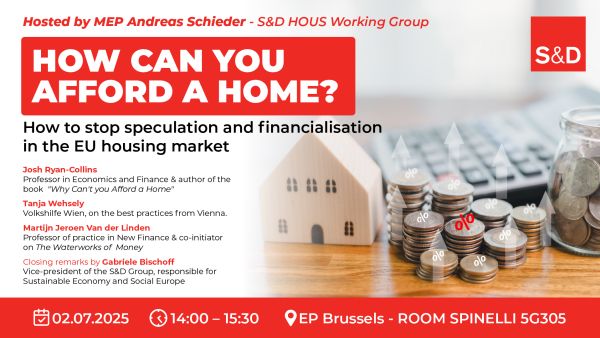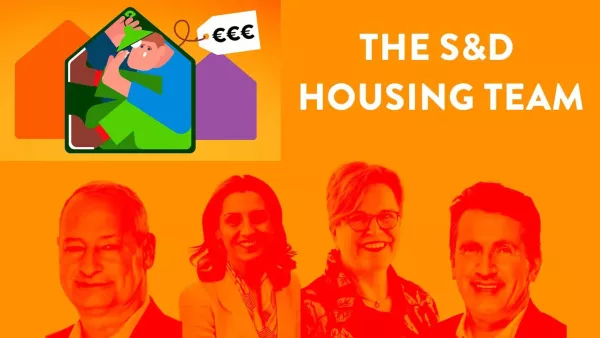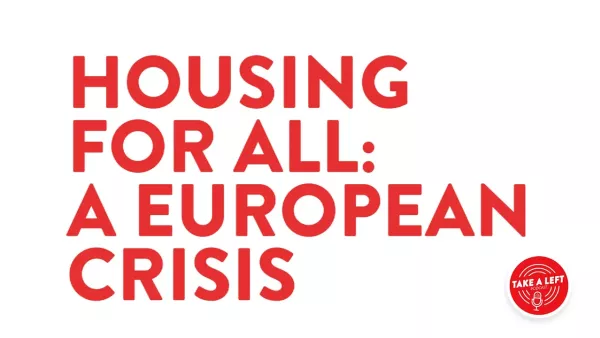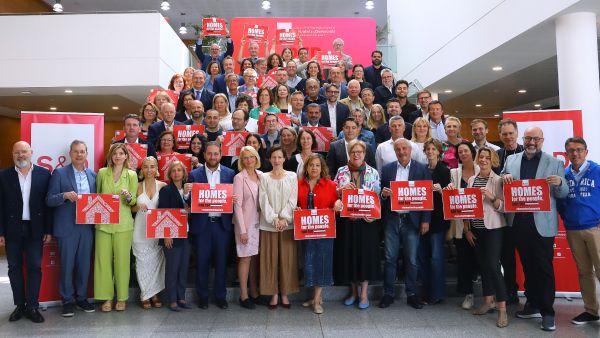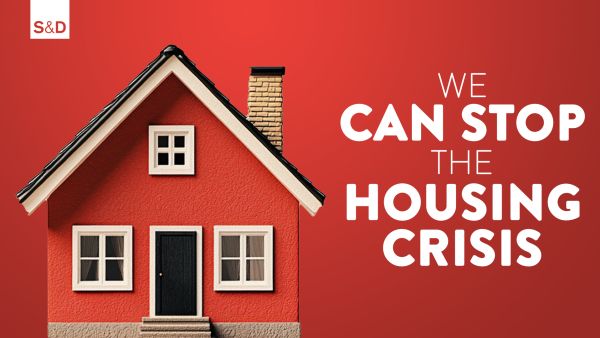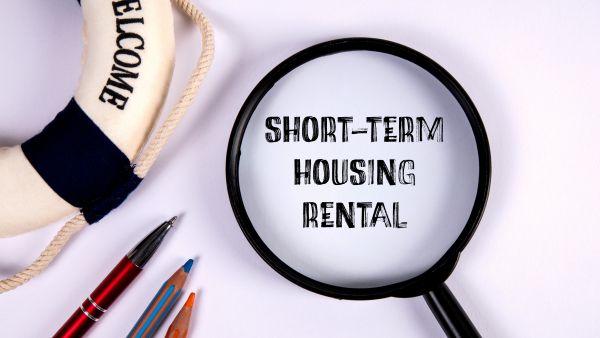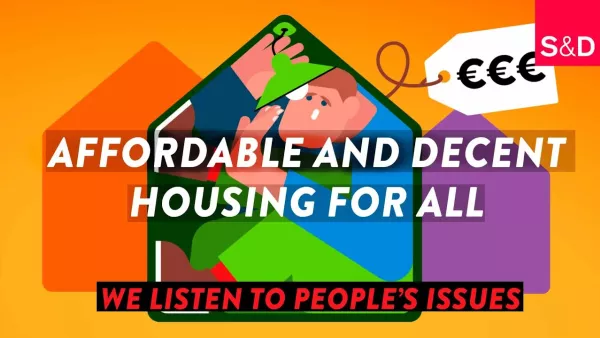The European Union is currently facing a pressing housing crisis that affects people across various income groups. From low to medium income earners, many grapple with affordability challenges, excessive costs, substandard living conditions and the risk of homelessness or eviction. The working poor, elderly, single parent families, young people, as well as migrants and refugees, bear the brunt.
This crisis is deeply rooted in growing socioeconomic inequality, large-scale financialisation of housing and land, as well as unsustainable housing systems that prioritise profit over human rights.
Inadequate housing conditions negatively affect people’s physical and mental health, quality of life and dignity, as well as their access to employment and essential services.
Housing market failures endanger social Europe, increase homelessness and poverty and undermine confidence in democracy.
We need to develop policies that ensure an adequate housing supply while striking a balance between economic development and the well-being of our communities. Our aim? Affordable and thriving living spaces for all.
An EU plan to ensure decent and affordable housing must include:
- Regulation of the European housing market
- Boosting public investment in green social housing
- Curbing housing prices
- Fighting homelessness
- Ensuring decent homes for children

Housing has finally become a priority in the European Parliament. We, S&Ds, are proud to have secured the first ever Commissioner for Housing, Dan Jørgensen. Together with Jørgensen’s backing we have a stronger voice when pushing for our Affordable Housing Plan.
We will strive for massive investments into affordable, decent and sustainable housing, strict conditions on how to use public and private investments, reform of state aid rules, adequate regulation of short-term rentals, ensuring affordable ownership, social housing for vulnerable groups and student housing, eradicating homelessness, and lowering electricity prices for households and businesses.

Housing is a social good and human right, not a commodity for trading and speculation.
However, real estate funds in the euro area have surged to a staggering €1 trillion, a substantial increase from the €350 billion recorded in 2010. How did this come about? The answer lies in the special privileges extended to private developers and investors.
These privileges encompass exemptions from capital gains taxes, tax guarantees, reduced taxes on rental income and even incentives related to inheritance. The consequence? Institutional investors poured a massive €64 billion into housing acquisitions in 2020 alone.
What's concerning is that private developers and investors now wield significant influence over our housing systems. They view housing as a speculative commodity, divorcing it from its essential social role.
Some national practices have exacerbated the situation. They've granted tax benefits to real estate speculators, favoured homeowners with tax incentives, introduced "golden visas" to attract foreign investors and even deregulated rental markets.
We must reclaim our housing from the grasp of speculators and investors. Let's make housing a fundamental right, accessible to all, rather than a privilege enjoyed by a select few. Join our movement for equitable housing, where every individual finds a place to call home, regardless of their financial means. Together, we can reverse the tide and ensure affordable, high-quality housing for all.
Here's what we are fighting for:
- a limit on the privatisation of public or social housing
- appropriate rules for rent
- full transparency of investments in residential housing
- curbing short-term resale of properties
- curbing the 'touristification' or 'Airbnb effect' of the housing market.

The EU must ensure enough high-quality and affordable social housing with a special focus on sustainability.
At least 30% of all new houses should be affordable housing for lower income groups and at least 30% affordable housing for the middle-income group.
It's time to prioritise social housing as a vital investment. In many countries, spending on social housing lags behind other areas of public spending, but the demand for it has never been greater. Lower-income individuals are feeling the squeeze when it comes to housing costs, and rising interest rates only make matters worse.
Furthermore, we must ensure green social housing. This not only means prioritising sustainability criteria but also ensuring access to recreational facilities, community centres, parks and green spaces, particularly in our most disadvantaged neighbourhoods.
This is also why the reform of EU fiscal rules, which is currently being negotiated, matters so much. Such reform is key to enabling an ambitious public investment agenda.
For the same reason, the European Commission should revise the EU state rules by broadening the target group of social housing to truly ensure affordable housing for all. Concretely, the Commission should appropriately adapt the target group definition of social housing in the legislation on services of economic general interest (SGEI). The EU should go for a wide notion of social housing as a universalistic model, where social housing is intended for all citizens with the aim of developing socially-mixed neighbourhoods.
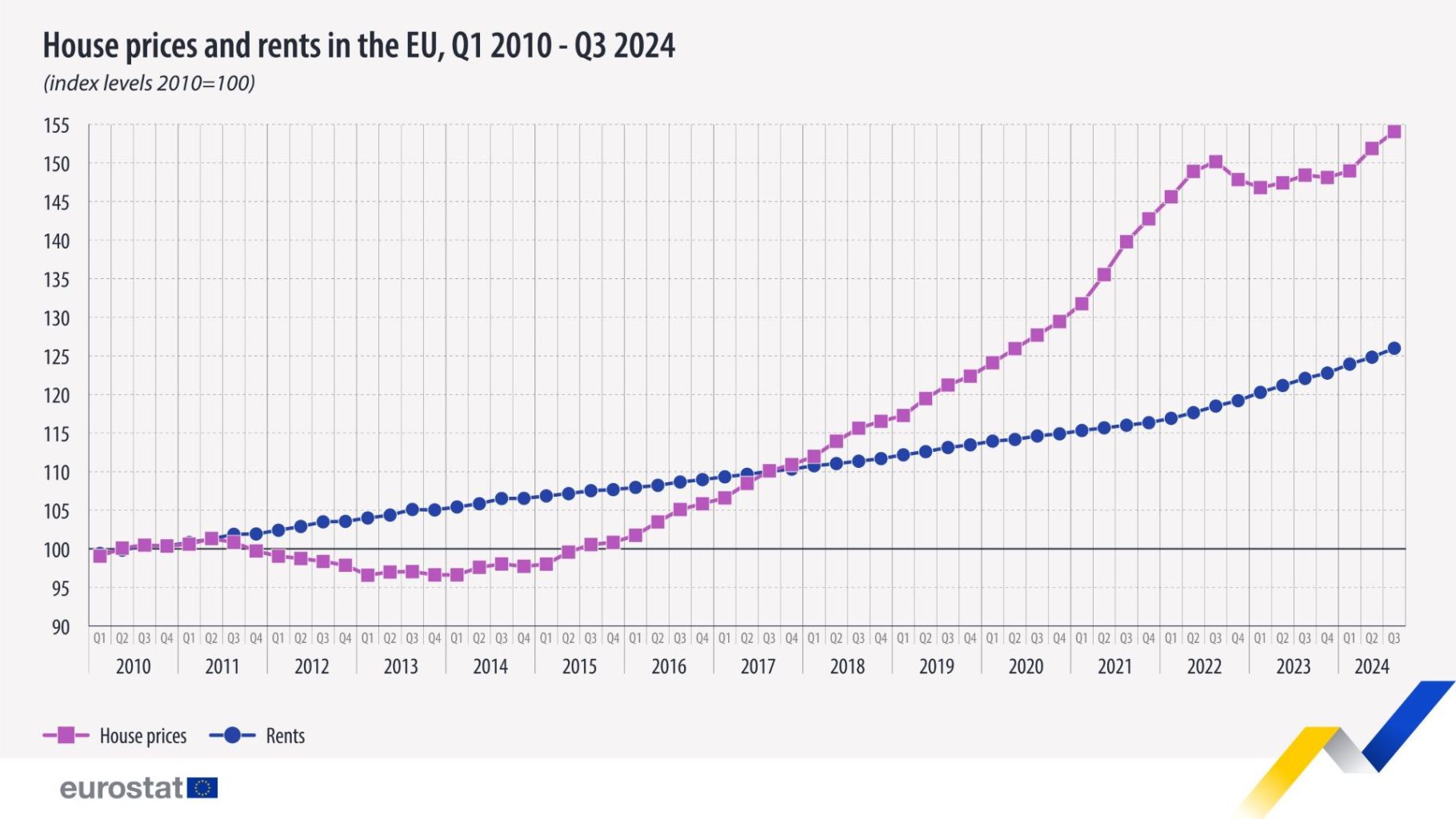
In early 2022, euro area households faced the steepest surge in consumer prices in decades, coupled with the first interest rate hike in over a decade. These high mortgage rates have resulted in a remarkable upswing in house price within the EU, nearing 10% growth in the first quarter of 2022 – a level not seen since the early 1990s.
Soaring mortgage rates are pricing families out of the housing market, and as interest rates rise for new loans, the burden on existing homeowners, especially in places with variable-rate mortgages, keeps growing.
Housing costs are rising sharply year after year, far outpacing our disposable income. For many Europeans, housing is the biggest expense. What's driving these skyrocketing prices? Real estate speculation is a major culprit, pushing housing costs to unsustainable levels.
The burden falls hardest on those at the bottom of the income ladder. From 2010 to 2024, rent prices shot up by 25%, while house prices skyrocketed by a staggering 52%. House prices have tripled in Estonia and Hungary, while they have more than doubled in Lithuania, Latvia, Czechia, Austria, Portugal, Luxembourg and Bulgaria.
Inefficient housing markets are driving income and wealth inequality in the EU. Public intervention in the mortgage market isn't just a good idea; it's a pressing social justice imperative. It's the key to fair wealth distribution.
It's time to take action:
- The EU must introduce a temporary rate ceiling to curb the quick rise of mortgage rates.
- To ensure social justice, banks and governments must act to protect the most vulnerable.
- National Affordable Housing Plans must be included within National Reform Programmes* (NRPs).
* National Reform Programmes are an essential part of EU economic governance. They offer a structured approach to shaping economic and fiscal policies in member states, with the overarching goals of stability, growth, and job creation. These plans are the basis for coordinated action.

As of 2025, more than 1,000,000 Europeans are homeless.
Homelessness deeply undermines human dignity. It also violates multiple human rights, including the right to housing, non-discrimination, health, access to clean water and sanitation, personal security, and freedom from cruel, degrading and inhuman treatment.
Homeless people and those living in informal housing often face criminalisation, harassment and discriminatory treatment.
To combat homelessness:
- All EU countries must embrace the Housing First programme to combat homelessness.
- Criminalisation of homeless people must end.
- Aporophobia (negative attitudes and feelings towards poverty and poor people) must be recognised as a hate crime.
- Discrimination due to homelessness should be banned across the EU.

Households with children are increasingly at risk of severe housing challenges. Many families with lower incomes are forced to live in overcrowded conditions, while the limited availability of social housing results in agonizingly long waiting lists.
Inadequate heating and insufficient access to safe water and sanitation remain widespread issues across several member states. These problems not only affect the well-being of our children but also impact their health, growth and education. It's crucial to understand that proper housing is the very foundation of a nurturing environment for our children's development and learning.
Our key messages:
- No child should live in a cold and overcrowded home.
- Children’s right to adequate housing should be ensured through public measures.
- The budget of the European Child Guarantee must be increased by at least €20 billion.
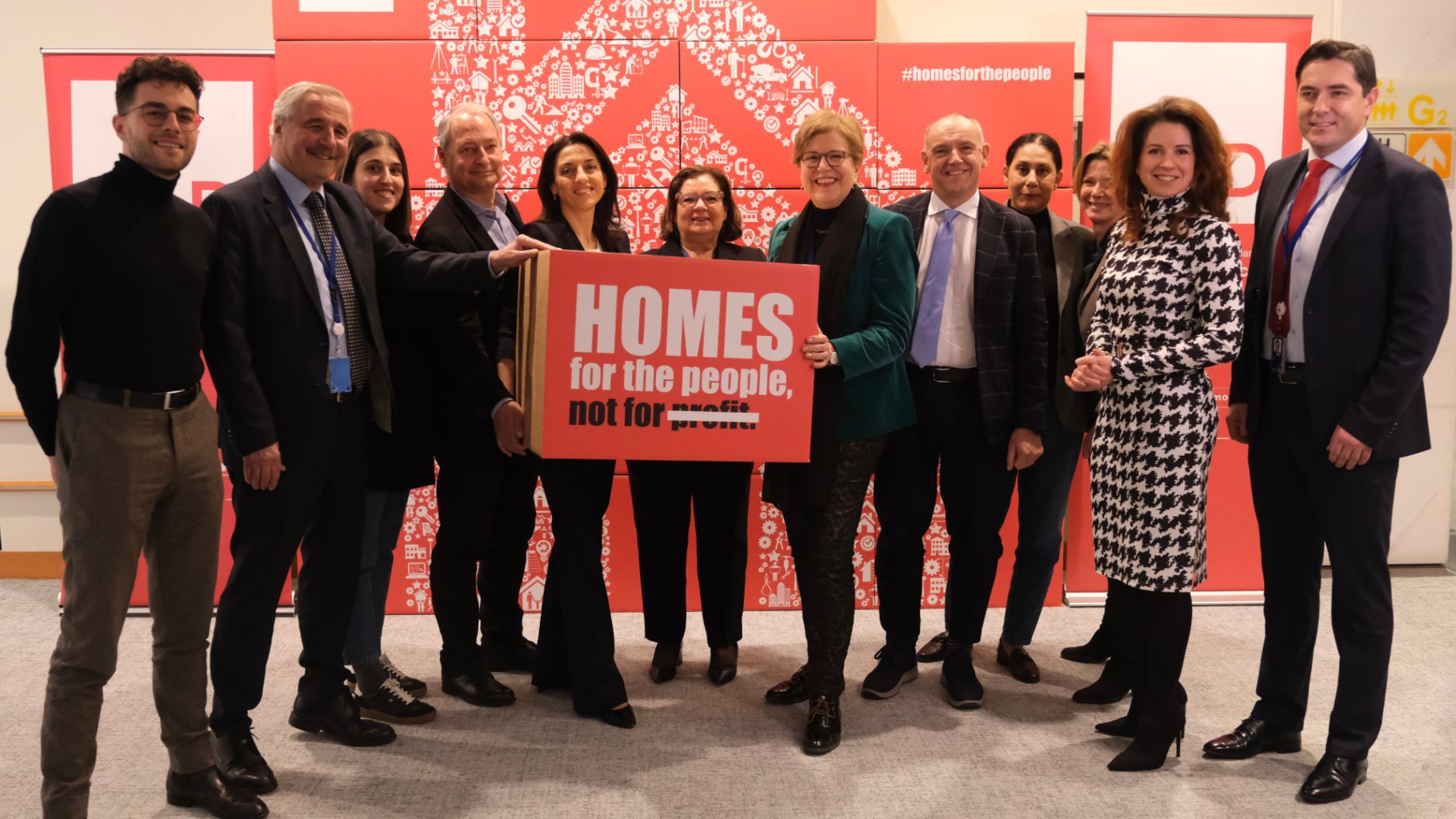
Housing is a social good and a human right, not a commodity for trading and speculation. Yet, we observe record housing costs across Europe hitting hard the young and old, the poorest and the middle class, while the rich are getting wealthier trading human rights for profit.
With the new special committee on the housing crisis up and running, this topic of major concern for millions of Europeans has finally become a priority in the European Parliament. The S&Ds brought housing to the forefront of the EU agenda, while actively campaigning for over a year for decent, affordable and sustainable homes. We are proud to have secured the new special committee in the European Parliament and the first European Commissioner for Housing. The S&Ds are happy to see Dan Jørgensen in this role.
A strong focus on housing in key EU institutions is essential for the implementation of the European affordable housing plan proposed by the S&Ds.
For more information on this special committee, and to see which MEPs are involved, take a look here.




